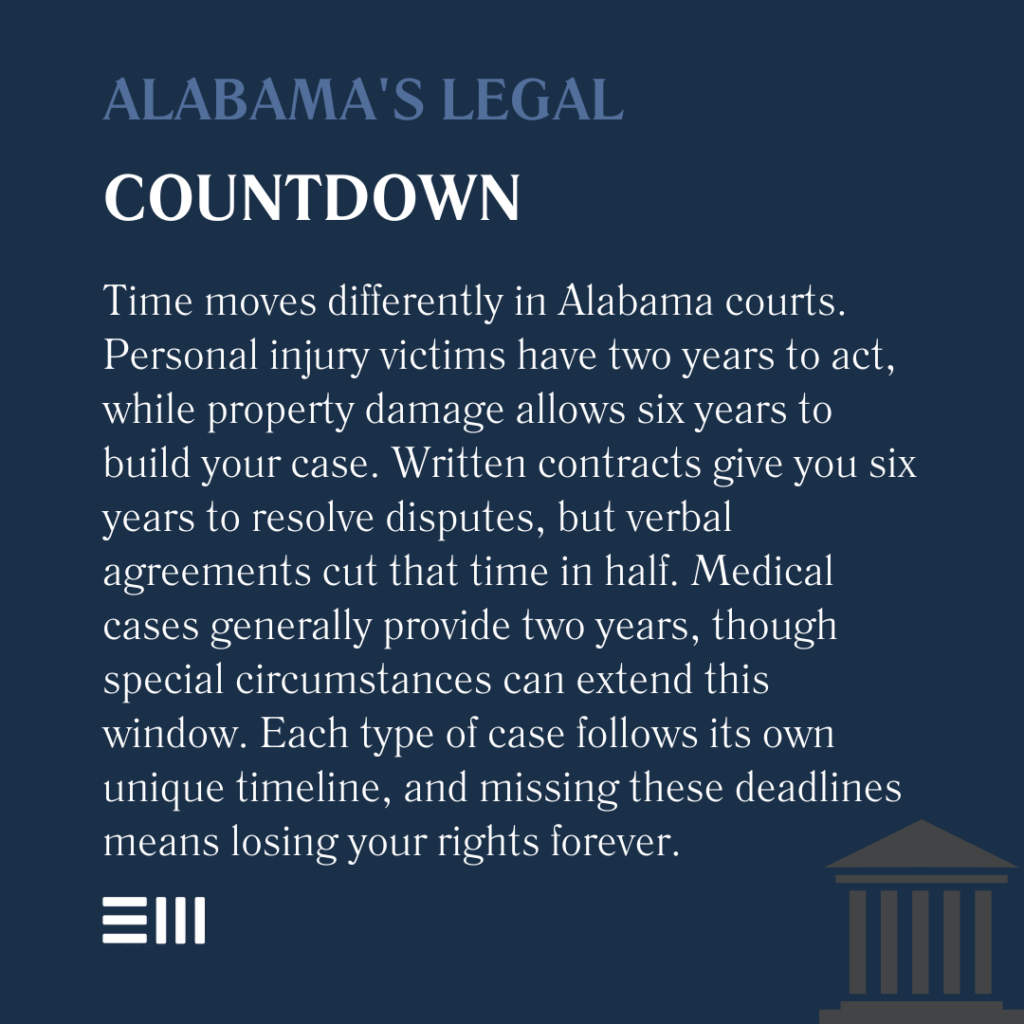
Cross a state line, and your legal rights might change as dramatically as the weather. While a personal injury claim enjoys a generous four-year window in Louisiana, that same case could be barred after just two years in Alabama.
These invisible legal boundaries shape the fate of countless cases, turning valid claims into cautionary tales about state deadlines.
What might be a perfectly valid claim on one side of a state border could be completely time-barred just a few feet away.
Navigating State-Specific Legal Deadlines in Alabama
Every state writes its own rules for legal timing, creating a complex web of deadlines that can trap the unwary.
Understanding Alabama’s specific timeframes isn’t just about knowing numbers—it’s about protecting your right to seek justice under our state’s unique legal framework.
The complexity of these deadlines often catches people by surprise, especially in our increasingly mobile society where people regularly live, work, and do business across state lines.

Alabama’s Legal Timeline Essentials
Legal deadlines in Alabama reflect our state’s distinct approach to justice and the balance between plaintiffs’ and defendants’ rights.
Understanding these deadlines requires looking at both the type of case and any special circumstances that might apply.
- Personal Injury: Two years from the date of injury marks the standard deadline, though some injuries may extend this through the discovery rule. This includes car accidents, slip and falls, workplace injuries, and most other physical harm cases. The clock typically starts running from the date of the incident, though certain circumstances might delay the start.
- Property Damage: Six years provides time to discover and document damage to real or personal property. This longer window recognizes that property damage isn’t always immediately apparent, particularly in cases involving construction defects or environmental contamination. The deadline applies whether the property is residential, commercial, or undeveloped land.
- Contract Disputes: Written contracts carry a six-year deadline, while verbal agreements must be pursued within three years. The distinction recognizes the greater reliability of written documentation and encourages parties to put their agreements in writing. This applies to everything from business deals to personal loans.
- Medical Malpractice: Generally two years, with special rules for minors and cases involving ongoing treatment. The complexity here comes from determining exactly when the clock starts – whether it’s from the date of the medical error, the date of discovery, or the end of the doctor-patient relationship.
- Fraud Cases: Two years from discovery, but no more than six years from when the fraud occurred. This “hybrid” deadline recognizes that fraud often remains hidden but also sets an outer limit to provide eventual closure.
These deadlines shape how justice unfolds in our state courts and require careful attention to preserve legal rights.

Interstate Complications and Considerations
When cases cross state lines, understanding deadline differences becomes crucial. The modern world of interstate commerce and mobility creates special challenges for legal timing.
- Out-of-State Accidents: The accident location often determines which state’s deadline applies. However, where you file the lawsuit might depend on where the defendant lives or does business. This creates a complex interplay between different states’ rules.
- Multi-State Contracts: Agreements might specify which state’s laws govern disputes. These “choice of law” provisions can effectively change which deadline applies, regardless of where the parties are located. Some contracts even specify shorter deadlines than state law would impose.
- Moving Between States: Changing residence doesn’t automatically change which deadline applies. The relevant deadline typically depends on where the cause of action arose, not where the parties currently live. This can create confusion when people relocate after an incident but before filing suit.
- Business Across Borders: Companies operating in multiple states must track varying deadlines. This becomes especially complex for businesses near state borders or those conducting e-commerce across state lines. Different states might apply different rules to the same transaction.
- Professional Licensing Issues: Professional malpractice claims might face different deadlines depending on both the state where the professional is licensed and where the service was provided.
Proper handling of interstate issues can preserve vital legal rights and prevent unnecessary complications.
Special Rules for Federal Cases
Federal courts add another layer of complexity to legal deadlines. These unique considerations affect many common claims and require special attention.
- Civil Rights Claims: Federal deadlines often differ from state timeframes. Claims under Section 1983 or other civil rights statutes follow specific federal timing rules, though they might borrow from state law in some circumstances.
- Employment Discrimination: Strict federal filing windows apply alongside state deadlines. For example, EEOC charges must typically be filed within 180 days, while state law might allow longer periods for similar claims.
- Maritime Law: Special federal rules govern accidents on navigable waters. These cases follow unique timing requirements that can differ significantly from land-based injury claims.
- Bankruptcy Claims: Federal law sets specific deadlines for various types of claims. The complexity increases when bankruptcy intersects with state law claims, potentially changing or suspending normal deadlines.
- Federal Government Claims: Cases against federal agencies or employees follow the Federal Tort Claims Act’s strict timing requirements, regardless of state deadlines.
Understanding federal timing requirements prevents costly mistakes and preserves important legal rights.
Frequently Asked Questions About State Filing Deadlines
Navigating state-specific legal deadlines raises many questions.
Here are answers to common concerns about timing across different jurisdictions.
Which State’s Deadline Applies to My Case?
The answer depends on several factors, including where the incident occurred, where the parties reside, and any contractual agreements specifying applicable law.
How Do State Deadlines Affect Multi-State Cases?
Cases involving multiple states may face different deadlines for different aspects of the claim. Professional guidance helps navigate these complexities.
Can I File in Another State to Get More Time?
While some cases might qualify for filing in multiple states, attempting to “shop” for longer deadlines can backfire and may violate legal ethics.
What if I Need to Sue an Out-of-State Company?
Deadlines for suing out-of-state entities often follow special rules. Early consultation helps determine the correct timing.
Take the First Step in Protecting Your Rights
State-specific deadlines create invisible but absolute barriers to justice. Don’t let confusion about timing cost you your legal rights.
Our experienced team understands Alabama’s unique requirements and how they interact with other state laws.
Can't find what you're looking for? Search our site below.










